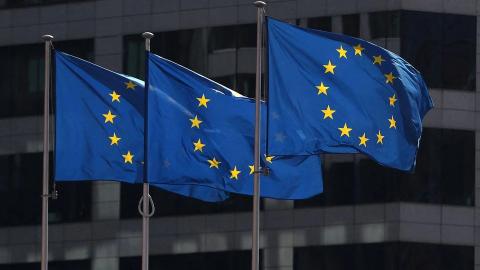EU to discuss visa ban for Russians, training kyiv troops for Prague talks
The EU plans to make it harder for Russians to travel to the bloc by suspending a deal that eases their visa applications, while EU defense ministers consider a military training program for Ukrainian forces.
The six-month-long conflict in Ukraine remains a foreign policy priority for the EU and a visa ban on Russians pushed by some mainly Eastern member states will be high on the agenda at meetings on Tuesday and Wednesday. (Reuters)
European Union foreign ministers meeting in Prague could agree to tighten visa issuance for Russians and start a debate on a broader ban on tourist visas, although there is no agreement on this, EU officials said.
An EU diplomatic source said on Monday that foreign ministers could agree in principle to suspend a visa facilitation deal with Russia, which would mean Russians would pay $80 instead of $35 dollars for EU visas, and would also face a longer procedure.
“The outcome of the Gymnich (meeting of foreign ministers) is unlikely to be an agreement to expand sanctions to include visas,” the source told reporters.
“But (the suspension of) the facilitation agreement will be the first step, and we will discuss how to include visas in the sanctions.”
The Czechs, who hold the rotating EU presidency, have themselves stopped issuing regular visas to Russians and have pushed for a European visa ban for Russian tourists, an idea supported mainly by the Baltic countries.
The bloc’s defense ministers, also meeting in Prague on Monday and Tuesday, will also discuss options for setting up an EU military training mission for Ukraine.
Several EU countries have been training Ukrainian troops for some time, mainly allowing them to use weapons that Western countries deliver to Ukraine to help it fight the Russian offensive.
It is not yet clear where an EU training program might be based and what mandate it might have, EU diplomats told Reuters ahead of the meeting of defense ministers.
READ MORE: EU ban on Russian coal means greater reliance on the dirtiest fuel
Opposite views
Some member states and the bloc’s foreign and security policy chief, Josep Borrell, have opposed the Russian visa tightening, arguing it could break EU rules and cut off Russian dissidents’ escape routes. .
“I don’t think cutting ties with the Russian civilian population will help and I don’t think this idea will get the required unanimity,” Borrell, who chairs meetings of EU foreign ministers, told Reuters. Austrian national television channel. on Sunday.
The EU source said there could be further discussions on how to impose visa sanctions and there could be exceptions for family members, civil society representatives or the students.
Lithuanian Foreign Minister Gabrielius Landsbergis said Estonia, Latvia, Lithuania, Poland and Finland, which all share a border with Russia, could act on their own to block tourists if the EU does not agree on a Union-wide ban.
Russians mainly enter the EU via the land borders of the five countries since direct flights between Russia and the bloc were suspended following Moscow’s offensive against Ukraine, according to Landsbergis.
In mid-August, Estonia closed its border to more than 50,000 Russians with previously issued visas, the first EU country to do so.
Ukrainian President Volodymyr Zelenskyy called on the West earlier this month to impose a blanket travel ban on Russians, prompting an angry rebuke from Moscow.
READ MORE: Citigroup closes commercial and consumer businesses in Russia
READ MORE: G7 leaders pledge to harm Russia economically as they wrap up summit
Source: Reuters


Comments are closed.